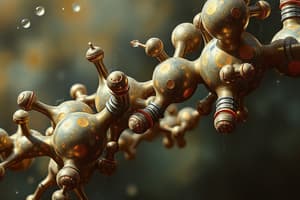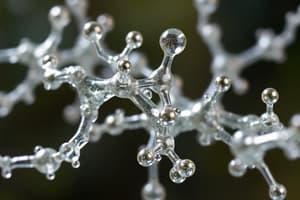Podcast
Questions and Answers
Enzymes are always composed entirely of carbohydrates and require no additional cofactors.
Enzymes are always composed entirely of carbohydrates and require no additional cofactors.
False (B)
Enzymes can be permanently altered by the reactions they catalyze.
Enzymes can be permanently altered by the reactions they catalyze.
False (B)
The active site of an enzyme is where substrates bind and is crucial for the enzyme's specificity.
The active site of an enzyme is where substrates bind and is crucial for the enzyme's specificity.
True (A)
Enzymes can function effectively in extremely high concentrations due to their ability to integrate into reaction products.
Enzymes can function effectively in extremely high concentrations due to their ability to integrate into reaction products.
The activity of enzymes can be influenced by factors such as temperature and pH levels.
The activity of enzymes can be influenced by factors such as temperature and pH levels.
Flashcards are hidden until you start studying
Study Notes
Characteristics of Enzymes
- Primarily composed of proteins, although some may require additional non-protein molecules known as cofactors for their activity.
- Function as organic catalysts, significantly increasing the rate of metabolic reactions in cells.
- Exhibit unique properties, including specific shapes that determine their function and the exact substrates they can bind to.
- Enable essential metabolic processes to occur at speeds necessary for sustaining life.
- Possess an active site specifically designed to bind target molecules, referred to as substrates, facilitating the reaction.
- Generally much larger in size compared to their substrates, allowing for a distinct interaction.
- Form transient associations with substrates without becoming part of the final products of the reaction, maintaining their original structure.
- Not consumed or permanently altered by the reactions they catalyze, leading to their ability to be reused multiple times.
- Capable of functioning efficiently even in extremely low concentrations due to their recyclability.
- Sensitivity to environmental conditions, including temperature and pH, which can greatly impact their activity.
- Can be regulated through feedback mechanisms and genetic control, ensuring the appropriate enzyme levels for various cellular conditions.
Studying That Suits You
Use AI to generate personalized quizzes and flashcards to suit your learning preferences.




